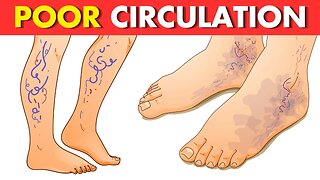Premium Only Content

Lack Of This Mineral Increases Your Risk Of Heart Attack
In a recent video, we talked about the benefits of magnesium for your body. Did you watch it?
Magnesium is an essential mineral necessary for maintaining good health.
It is part of many body functions, from regulating the nervous function to alleviating muscle pain and heartburn, preventing osteoporosis, and controlling blood sugar levels.
Since it is necessary for so many body functions, low magnesium levels can lead to serious diseases, such as diabetes and heart disease.
According to recent studies, low magnesium levels are associated with hypertension and a high risk of strokes and heart disease.
According to a study by researchers from the Erasmus University Medical Center, Netherlands, magnesium deficiency can increase the risk of death by coronary heart disease and sudden heart arrest.
Did you know that just a small increase in magnesium levels can save a person from these risks?
According to experts from the Journal of the American Heart Association, magnesium protects the body against heart disease, reducing the inflammation associated with atherosclerosis or the hardening of arteries.
Magnesium also improves blood circulation and regulates blood pressure.
As we saw in a recent video about hypertension, the disease is a risk factor for heart diseases.
A recent study published in the Diabetes Research and Clinical Practice found that low magnesium levels are related to diabetes and hypertension.
Both conditions can aggravate the risk of developing heart disease.
When we talk about diabetes, researchers observed that diabetic people tend to have low magnesium levels or are more prone to a magnesium deficiency than non-diabetics.
A study done by researchers from the Federal University of Bahia, Brazil, found that 75% of people with type 2 diabetes have a magnesium deficiency.
Some studies indicate that magnesium plays a role in the pathogenesis of diabetes, affecting insulin sensibility.
According to clinical trials, low magnesium levels are associated with a higher risk of insulin resistance, a precursor of type 2 diabetes.
Insulin resistance happens when there is too much sugar in the blood.
The pancreas responds by releasing more insulin to induce cells to absorb the sugar in the blood.
But, with time, the cells become resistant to insulin and stop responding to it.
Magnesium is necessary for using glucose and for signaling insulin.
For this reason, metabolic changes in cellular magnesium can lead to insulin resistance, which, in turn, contributes to the development of type 2 diabetes.
Enjoying the video? Then, give it a like and share it with your friends!
You can also contribute to the channel through the Thanks button. Don't forget to subscribe to be notified of any new videos!
What can we do to increase magnesium intake?
To learn what is your magnesium level is, ask your doctor for a blood test.
It is worth mentioning that magnesium supplementation should be prescribed by a doctor or nutritionist since the recommended dose varies according to the cause of your deficiency.
If you want to increase your consumption of foods rich in magnesium, try beans and lentils, oats, whole wheat, brown rice, avocado, banana, and kiwi.
Broccoli, pumpkin, and leafy greens, like collard greens and spinach.
Pumpkin and sunflower seeds.
Almonds, hazelnuts, Brazil nuts, cashew nuts, and peanuts are other sources of magnesium.
Milk, yogurt, and other by-products, as well as coffee, meat, and chocolate.
So, did you like learning how magnesium can reverse diabetes and heart diseases?
Follow us on:
Facebook - https://bit.ly/38BWbw3
Pinterest - https://bit.ly/2Irvwa6
---------------------------------------
Disclaimer: The materials and the information contained on Natural Cures channel are provided for general and educational purposes only and do not constitute any legal, medical or other professional advice on any subject matter. These statements have not been evaluated by the FDA and are not intended to diagnose, treat or cure any disease. Always seek the advice of your physician or other qualified health provider prior to starting any new diet or treatment and with any questions you may have regarding a medical condition. If you have or suspect that you have a medical problem, promptly contact your health care provider.
-
 4:50
4:50
Natural Cures
1 year ago $1.29 earned5 Warning Signs of Poor Circulation and How to Fix It
4.27K3 -

SpartakusLIVE
7 hours ago#1 Rocket CHAMPION of Verdansk wields UNSTOPPABLE new META
71.6K5 -
 2:55:11
2:55:11
Barry Cunningham
7 hours agoPRESIDENT TRUMP MADE TODAY A VERY BAD DAY TO BE A DEMOCRAT!
86.8K57 -
 1:15:29
1:15:29
Flyover Conservatives
1 day agoFrom Cool to Cringe: How Democrats Lost America’s Ear | FOC Show
38.5K13 -
 8:19
8:19
MattMorseTV
10 hours ago $4.94 earnedTrump is ACTUALLY DOING IT.
36.5K37 -
 11:30:43
11:30:43
ZWOGs
13 hours ago🔴LIVE IN 1440p! - Tarkov w/ Casey & crgoodw1n, Kingdom Come Deliverance, & More - Come Hang Out!
32.2K5 -
 2:30:56
2:30:56
We Like Shooting
17 hours ago $2.71 earnedWe Like Shooting 625 (Gun Podcast)
28K1 -
 1:45:02
1:45:02
Glenn Greenwald
8 hours agoIsrael Slaughters More Journalists, Hiding War Crimes; Trump's Unconstitutional Flag Burning Ban; Glenn Takes Your Questions | SYSTEM UPDATE #504
132K175 -
 1:29:31
1:29:31
Killerperk
5 hours ago $0.78 earnedRoad to BF6. Come hang out #regiment #bf6
30.2K2 -
 4:35:45
4:35:45
Jokeuhl Gaming and Chat
6 hours agoDARKTIDE - Warhammer 40k w/ Nubes Bloobs and AoA
20.9K2